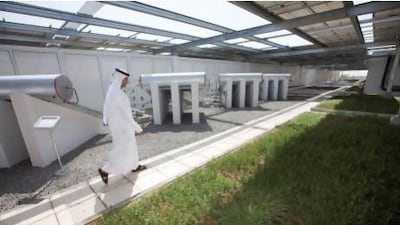The Dubai Electricity and Water Authority (Dewa) service centre in Al Quoz is a building unlike any other in the world.
Officially launched yesterday, the 31,587 sq m facility was awarded platinum certification, the highest available under the Leadership in Energy and Environmental Design international benchmark scheme for green buildings.
It is one of the most energy efficient buildings in the region, as well as the largest platinum certified government green building in the world.
Abdullah Obaidullah, executive vice president at Dewa, said the authority wants to inspire others to aim high when constructing new buildings and to consider energy and water savings when retrofitting existing ones.
"What we want to show is that it is possible," he said.
The service centre is fitted out with sustainably sourced wood and highly-efficient lights, while the roof has 222 sq m of solar photovoltaic panels.
The panels, which convert sunlight into electricity, are built into an elevated array about two metres tall.
The solar power system has a capacity to generate 660 kilowatt hours of electricity. The entire building needs about two megawatts of power daily.
About a third of the roof is also covered by a specially designed garden, planted with adaptive grasses that help insulate the building.
The greenery relies on black water, the run-off from the buildings' toilets, which is cleaned to safe standards and reused.
Run-off from wash basins, known as grey water, is also collected and treated in a separate system that runs the air-conditioning units and flushes the toilets.
Each of the two systems is capable of treating a hundred cubic metres of water daily.
The building's overall water needs amount to 150 to 170 cubic metres per day.
The service centre was first conceived in May 2010 but it was not until 2011 that Dewa decided to push the sustainability agenda and aimed for the platinum certification, said Mr Obaidullah.
"The real push came in 2011 because things like these take a while for people to really evaluate and adopt," he said.
However, going green came at a cost. While the original contract was for Dh55 million, "once sustainability was introduced, that increased the cost by approximately Dh22m", said Mr Obaidullah.
"Now the culture of Dewa is a little bit changed. Once you prove there is the benefit of green drives, you embed it into your daily operation, you embed it into your future strategies," he said.
vtodorova@thenational.ae

